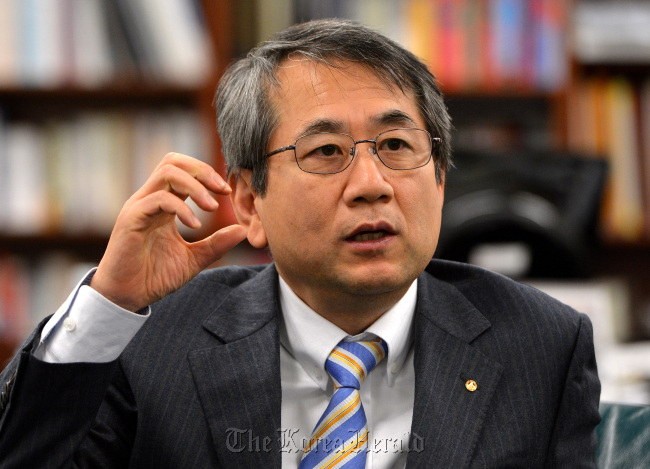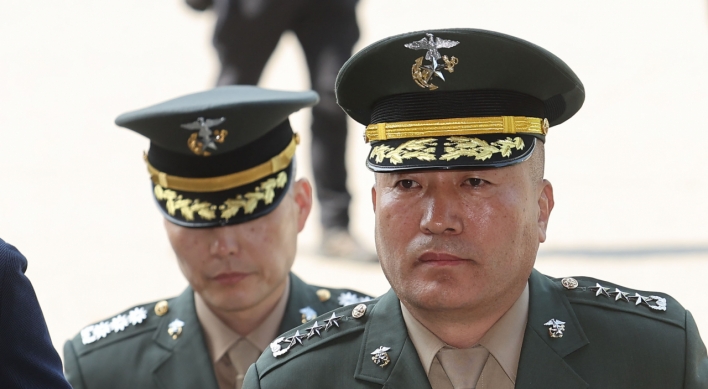Sejong University bets on new technology
President Shin’s global growth plan expands research in environment, energy and aerospace
By Korea HeraldPublished : Dec. 17, 2012 - 20:40
Sejong University derives its name from Korea’s most respected king, who oversaw the creation of the Korean alphabet and a slew of technological advances including the invention of a water clock, a sundial and new farming techniques during the Joseon Dynasty.
Following the spirit of Sejong the Great, the university is striving to establish itself as the nation’s center of education and research in the fields of environment, energy and aerospace that hold the keys to the future of mankind.
The school was first founded in 1940 during the colonial period and became a two-year women’s college in 1947. Since it became a coeducational college in 1979, it has been best known for its college of hospitality and tourism management,
Shin Koo, the president of Sejong University, said the new science and technology fields are key for the school to achieve its goal to become one of the world’s 100 top universities by 2020, when it turns 80 years old.
“We cannot be a global leader if we just follow what others do. We need to build our own strength,” the chemist who took office in July said in an interview with The Korea Herald.
Following the spirit of Sejong the Great, the university is striving to establish itself as the nation’s center of education and research in the fields of environment, energy and aerospace that hold the keys to the future of mankind.
The school was first founded in 1940 during the colonial period and became a two-year women’s college in 1947. Since it became a coeducational college in 1979, it has been best known for its college of hospitality and tourism management,
Shin Koo, the president of Sejong University, said the new science and technology fields are key for the school to achieve its goal to become one of the world’s 100 top universities by 2020, when it turns 80 years old.
“We cannot be a global leader if we just follow what others do. We need to build our own strength,” the chemist who took office in July said in an interview with The Korea Herald.

The school established the department of energy and resources in 2010 with some $10 million in support from the Seoul government.
The aim of the course, the president said, is to develop leaders who work to secure sustainable energy resources and create new forms of energy to counter the depletion of the world’s natural resources.
Energy shortage is a global problem, but particularly crucial in Korea, where more than 90 percent of energy resources are imported, he said.
“We’re focusing on producing trained personnel who can go overseas and export technologies for resource-rich but poor countries,” he added.
The 54-year-old educator noted that Sejong also aims to build a strong foundation in the field of aerospace science and engineering.
The department of aerospace engineering is the first school in Asia to acquire permission to access the NASA Hubble Space Telescope, and it was also recognized as an outstanding research institution by the government, receiving research funding of 1 billion won ($930,000) each year since 2002.
“Korea’s strongholds in auto manufacturing and shipbuilding are losing their competitive advantage to China and other countries. We need to find a new field, and I think the aerospace industry could be the one.”
Sejong took another step in strengthening its position in resource development research by introducing a new biotechnology course this year.
Shin said the course is designed to support the development in food, biological products and medicines. The study is already recognized for its pivotal role, in particular, in agriculture ― thanks to a growing population demanding a richer diet.
The school recently signed an agreement with Syngenta, the world’s largest agrochemical producer, to develop new innovative areas and research talent, he said.
Apart from expanding research in energy resources, Sejong also aims to further strengthen its specialty in hospitality and tourism management.
The college of hospitality and tourism management is one of the most respected courses in the country and is still at the center of Sejong’s education.
The department of food service management, which has produced numerous top chefs in nation, with the support from the government now seeks to establish a Korean culinary school to help globalize Korean cuisine.
He said globalization has been one of his main priorities since he took the helm of Sejong this summer.
Sejong is currently in partnerships with over 133 universities in more than 26 countries around the globe, and there are about 400 foreign students at the campus.
And the school is now building a new residence hall on campus to expand the number of international students to over 1,000, he said.
“Sejong is no longer a regional university. We are a small but strong university.”
But Shin admits he now has concerns over the rapid decline in student population in the nation.
According to government data, by 2050, the number of students in Korea will almost halve due to the country’s low birthrate. And the significant drop in the number of students is expected to see schools merge or close down over the next 40 years, he said.
“Within a decade or so, most universities will undergo radical changes to survive, but we’re already preparing for the difficult time by specializing in a particular subject area, and focusing on the areas where we can excel,” he added.
Shin Koo
● Shin was named president of Sejong University in July 2012. He has worked as a professor at the school of natural sciences since 1989. He served as dean of the school also served as its vice president.
● Shin graduated from Yonsei University with a bachelor’s degree in chemistry in 1981 and earned his doctoral degree in the same field at the University of Iowa in 1988.
By Oh Kyu-wook (596story@heraldcorp.com)
-
Articles by Korea Herald



















